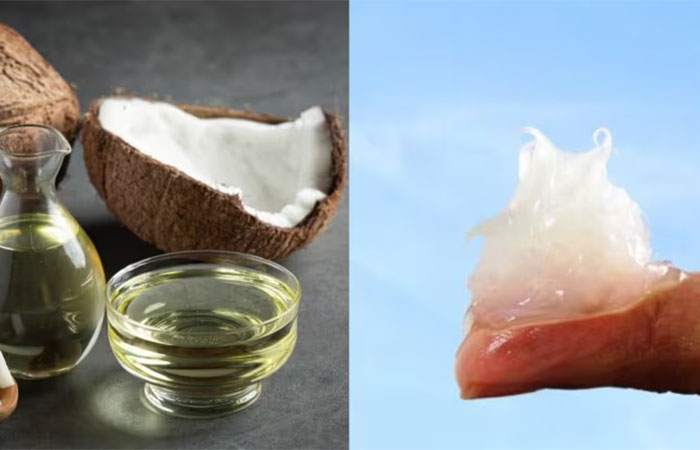
Coconut oil is often the preferred choice of women with dry skin or hair. Giving it a tough competition is petroleum jelly, which also helps moisturize the skin. It’s a good solution to problems like chapped lips and dry skin that need moisture and nourishment. So clearly, it’s difficult to choose between coconut oil and petroleum jelly. Don’t worry, as a dermatologist shares which one is better for your skin, especially your face. Find out who wins in this coconut oil vs petroleum jelly debate
Maintaining healthy skin is important for both physical health and overall appearance. Dry skin is a common problem that can cause discomfort, itching, and even flaking. To combat this issue, people often use moisturizers to keep their skin soft and supple. Two popular choices for moisturizing dry skin are coconut oil and petroleum jelly. In this article, we will compare these two options and discuss which one is better for dry skin.
Coconut Oil Coconut oil is a natural oil that is derived from the meat of a coconut. It contains medium-chain fatty acids, which help to nourish the skin and keep it hydrated. Coconut oil has been used for centuries in tropical regions to treat various skin conditions, including dry skin.
One of the advantages of coconut oil is that it is a natural product that does not contain any synthetic or harmful chemicals. It is also rich in antioxidants, which help to protect the skin from damage caused by free radicals. Additionally, coconut oil has anti-inflammatory properties that can help to soothe and calm irritated skin.
Coconut oil can be applied directly to the skin, either alone or mixed with other natural ingredients like honey or aloe vera. It is easily absorbed by the skin, providing deep hydration and leaving a light, pleasant scent. Coconut oil is suitable for all skin types, but it may not be the best choice for people with acne-prone or oily skin, as it can clog pores and cause breakouts.
Petroleum Jelly Petroleum jelly, also known as petrolatum, is a semisolid mixture of hydrocarbons that is derived from petroleum. It is a common ingredient in many skincare products and is often used as a moisturizer for dry skin.
Petroleum jelly works by forming a protective barrier on the skin that helps to lock in moisture. This barrier also helps to protect the skin from environmental factors like wind and cold weather. Petroleum jelly is a popular choice for people with extremely dry or sensitive skin, as it is hypoallergenic and non-irritating.
One of the drawbacks of petroleum jelly is that it is a synthetic product that may contain impurities. It can also be difficult to absorb, leaving a greasy residue on the skin. Some people may find the texture and smell of petroleum jelly unpleasant.
Comparison Both coconut oil and petroleum jelly have benefits and drawbacks when it comes to moisturizing dry skin. Coconut oil is a natural product that is rich in antioxidants and has anti-inflammatory properties. It is easily absorbed by the skin and has a pleasant scent. However, it may not be the best choice for people with acne-prone or oily skin.
Petroleum jelly, on the other hand, is a synthetic product that forms a protective barrier on the skin. It is hypoallergenic and non-irritating, making it a good choice for people with sensitive skin. However, it can be difficult to absorb and may leave a greasy residue.
Ultimately, the choice between coconut oil and petroleum jelly depends on personal preference and skin type. If you prefer natural products and have normal to dry skin, coconut oil may be the better choice for you. If you have extremely dry or sensitive skin, or prefer a synthetic product, petroleum jelly may be the better choice.
Regardless of which product you choose, it is important to use a moisturizer regularly to keep your skin healthy and hydrated. Remember to drink plenty of water and protect your skin from the sun to help maintain a healthy and youthful appearance.
Potential health problems you can face after using petroleum jelly for long
While petroleum jelly is generally considered safe for use on the skin, there are potential health problems that can arise from using it for extended periods of time. Here are some of the potential health problems that you may face after using petroleum jelly for a long time:
It is important to note that these potential health problems are generally associated with prolonged or excessive use of petroleum jelly. In most cases, occasional use of petroleum jelly is unlikely to cause any significant health problems. However, if you have any concerns about using petroleum jelly, it is always best to consult with your healthcare provider or a dermatologist. They can advise you on the best skincare products to use based on your individual needs and skin type.
Natural alternatives to petroleum jelly for face
If you're looking for natural alternatives to petroleum jelly for your face, there are several options that can provide similar moisturizing benefits without the potential health risks associated with petroleum products. Here are some natural alternatives to consider:
These natural alternatives are safe for most skin types and can provide similar moisturizing benefits to petroleum jelly without the potential health risks associated with petroleum products. However, it is always best to consult with a dermatologist or healthcare provider before using any new skincare product, especially if you have sensitive skin or any skin conditions.
Established in 2013, FamilyNeeds.net is connected to your lifestyle and everyday life. Publish reviews of your life, style, fashion and essentials.